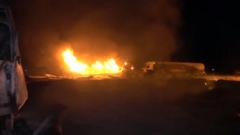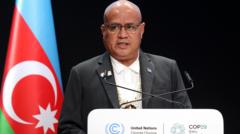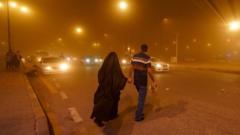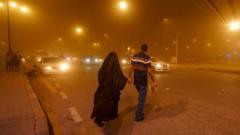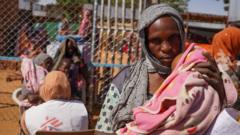As torrential rains hit, Kinshasa grapples with humanitarian challenges amidst a rebounding rebel offensive.
**Tragic Flooding in Kinshasa: A Dual Crisis for Congo**

**Tragic Flooding in Kinshasa: A Dual Crisis for Congo**
Severe floods in the Congolese capital compound ongoing conflict in the east, leading to loss of life and displacement.
In a devastating turn of events for the Democratic Republic of Congo, torrential rains have led to widespread flooding in the capital city of Kinshasa, causing the deaths of dozens and displacing thousands of residents in recent days. The heavy rains have caused the Ndjili River to overflow, engulfing vital infrastructure and residential areas, including major roads such as Lumumba Boulevard that connects to the international airport. Officials reported at least 33 confirmed fatalities, although concerns remain that the death toll may continue to rise as the waters slowly recede.
The floods have persistently plagued the nation, with many parts of Africa experiencing extreme weather patterns attributed to climate change. The Democratic Republic of Congo, Africa's second-largest nation, has suffered particularly severe flooding in the past years — in 2024 alone, over 300 people were reported dead, and 280,000 households displaced due to similar climate-induced disasters.
Local resident Denise Sukali, 45, expressed her plight as she took refuge in a church with her children, lamenting the loss of their home to the floodwaters. "We just managed to save our lives," she stated, highlighting a personal tragedy echoed by many displaced families. President Felix Tshisekedi visited affected areas and pledged to provide food and resources to those impacted, attributing the disaster partly to illegal settlements that have emerged in Kinshasa due to unregulated urban growth and inadequate drainage systems.
Compounding this calamity, the Democratic Republic of Congo is already grappling with a humanitarian crisis stemming from a resurgence of conflict in the eastern regions, where violence has resulted in the deaths of thousands and the displacement of nearly seven million people. In 2024, the United States led one of the largest humanitarian efforts in the country, investing $910 million in food and shelter for those in need. However, impending reductions in foreign assistance could leave millions, including vulnerable children at risk of malnutrition, without critical support.
As Kinshasa begins to assess the extent of the recent flooding, the twin crises of natural disasters and armed conflict pose unprecedented challenges to a nation in dire need of stability and aid.
The floods have persistently plagued the nation, with many parts of Africa experiencing extreme weather patterns attributed to climate change. The Democratic Republic of Congo, Africa's second-largest nation, has suffered particularly severe flooding in the past years — in 2024 alone, over 300 people were reported dead, and 280,000 households displaced due to similar climate-induced disasters.
Local resident Denise Sukali, 45, expressed her plight as she took refuge in a church with her children, lamenting the loss of their home to the floodwaters. "We just managed to save our lives," she stated, highlighting a personal tragedy echoed by many displaced families. President Felix Tshisekedi visited affected areas and pledged to provide food and resources to those impacted, attributing the disaster partly to illegal settlements that have emerged in Kinshasa due to unregulated urban growth and inadequate drainage systems.
Compounding this calamity, the Democratic Republic of Congo is already grappling with a humanitarian crisis stemming from a resurgence of conflict in the eastern regions, where violence has resulted in the deaths of thousands and the displacement of nearly seven million people. In 2024, the United States led one of the largest humanitarian efforts in the country, investing $910 million in food and shelter for those in need. However, impending reductions in foreign assistance could leave millions, including vulnerable children at risk of malnutrition, without critical support.
As Kinshasa begins to assess the extent of the recent flooding, the twin crises of natural disasters and armed conflict pose unprecedented challenges to a nation in dire need of stability and aid.

